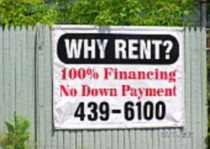Coach Mitch’s REFLECTIONS
My response to:
Investment opportunity: Pima County’s delinquent property tax liens go up for sale
Inside Tucson Business February 08, 2008
It’s the stuff of which late-night TV infomercials are made: An investment opportunity where anyone can make money. Welcome to Pima County’s annual tax lien sale.
On Wednesday (Feb. 13), The Daily Territorial will publish Pima County’s annual listings of properties whose tax liens are up for sale.
There are a number of organizations happy to take your money to explain how the system works and how you can make money from it.
Ed. – I do appreciate the literary license; however, don’t you also get the feeling in the underlying message that this activity is being portrayed as a bit roguish. The writer may not be saying that this activity is outright malicious, but definitely unsavory. So much for an unbiased press.
I have always found it indicative of the hypocrisy of the government that it creates a program meant for investors to take advantage of and then they always embarrasses investors when they try to take advantage of the program government created for them to take advantage of.
Similarly, the press extols those who do not pay their taxes and excoriates those who do pay the outstanding taxes, in the form of tax liens. This underscores the presses essential attitude which is often anti-business, anti-profit, anti-initiative and pro-egalitarian.
Then there’s this opinion from Pima County Treasurer Beth Ford: “Welcome to, in my humble opinion, the ultimate in buyer beware. On your own volition, you are about to do business with government and government has written every one of the rules by which we play this game. Caveat emptor! Let the buyer beware! Good luck and good bidding.”
This statement is why I picked this article to critique. This is one of the most honest statements of fact that I have ever seen in print. Read every word. “On your own volition you are about to do business with government, and government has written every one of the rules …Caveat emptor!” How true. How true.
Do not be fooled in any way. Government creates all the rules in its favor. For every rule which seemingly binds government there is an unknown and unseen rule which allows the government to exempt itself from following that very rule; and all in the name of protecting the public, of course.
For people who know and understand the rules, there is money that can be made. In fact, some of those online services say Arizona’s system of selling tax liens makes for one of the best investment opportunities of its kind in the nation.
I’m not sure why. Maybe it is true for Maricopa County. The county sells virtually all of its liens, even the ones that are worthless. Therefore the real winner is the county, not necessarily the investor.
Investors can earn up to 16 percent return for buying tax liens, though typically the most desirable properties wind up with interest rates far less than that. And that’s precisely what investors are bidding on in these auctions. Whoever bids the lowest interest rate wins.
And for that, the successful bidder gets a certificate from the county that says they hold the tax lien.
First they say it is “one of the best investment opportunities”, and then it is shown to be a bidding war for the lowest rate of return. How contradictory.
Then, there is the possibility the lien certificate holder could ultimately wind up as the owner of the property. But that takes some more work involving the courts.
Here are some FAQs to help explain Pima County’s delinquent tax lien sale:
Q4. What information is published?
A. Each lien has a specific item number and then is described by its parcel number, name of property owner and property description as it appears on the County Assessor’s tax rolls. (There is no guarantee from the County Assessor that its information is correct.) The listing also contains the amount of the tax lien due, including interest and penalties as of the end of February.
Ed. – There is a great deal more information that is available and necessary to understand prior to making any decision to invest.
Q9. What do I do with the information that’s published in The Daily Territorial?
A. This is where the real work comes in. If you find a piece of property that interests you, investigate it thoroughly. Consider whether you believe the property will be worth owning if you need to initiate foreclosure.You should also thoroughly research the genealogy of the property. Was it subdivided from a larger parcel that might also have had liens on it that somebody else owns? Determine if there are any issues over the title, including environmental problems. That abandoned gas station on a busy corner may look like prime real estate but not if there’s an old gas leak that needs remediation.
Ed. – I like this answer. It starts out really well. The only real question is “Do I want to own the property?” After doing a bit of due diligence, I am sure that an obvious answer will show itself. Either the property is worth owning, for the cost of several years taxes plus the cost of a foreclosure process – or it is not.
The fear of environmental issues is significant and with good reason. But, have you ever asked yourself, “Is there anyone who is not afraid of property with environmental problems?” Yes, there are and they would see these types of property as an opportunity. All you need do is present the opportunity to them, stand back and let them show you how to make lemonade out of lemons. Somehow the press just does not get this idea. That is why I suggest that they are anti-initiative.
Q10. Are there other warnings of pitfalls?
A. Some of the more common warnings include the possibility the Board of Supervisors could change the classification or value of the property to either adversely affect the amount of the tax or increase the amount of the tax lien that is owed (in which case the certificate holder would have to pay the additional amount). There is also the possibility that a property either has or will declare bankruptcy, which puts the matter in the court’s hands. There might also be special assessments that have been levied on the property that the county might not know about, such as a homeowner’s association fee.
Ed. – More good warnings. Investors should know that the system is set up so that no investor will lose their principle. They may lose any interest that they thought that they would accumulate but their principle will eventually be returned to them.
Q11. Are there resources to help with the research?
A. The Pima County Treasurer’s Office has computer research tools and access to microfiche and microfilm data. Delinquent tax specialists are also available during normal county hours, 8 a.m. to 5 p.m. weekdays. The phone number is (520) 740-3785.
Ed. – A great benefit of online auctions is that the county is making research tools much more available and allowing more easy availability to records. Internet access to records is becoming prevalent. This makes it possible for those from out-of-state and foreigners to invest with confidence and ease.
Q12. What do I bid?
A. Basically, you’re bidding on the interest you’re willing to accept on the delinquent tax that’s owed. By law it starts at 16 percent and goes down. The lowest interest rate wins. A desirable piece of property could have an interest rate of 5 percent or less.
Ed. – Interest rates often go down to zero, that is, they get no interest at all. Or, people pay a premium, meaning, they even pay more than the amount of the lien.
I have never seen any explanation in these stories as to why an investor would do something like this. Are they crazy? Sure, crazy like a fox.
Imagine, in a competitive bidding situation you purchased a TLC for 0% interest. The rules stipulate that, the next year, you would have the first right of refusal to pay the taxes – without any competitive bidding. In Florida, the interest rate is 18%. That means that you would be getting a 9% average interest over two years. That is much better than most other traditional investments such as CD’s or most bonds. Additionally, those financial instruments do not have a significant piece of property as collateral.
Q17. Who pays the future property taxes?
A. The property owner could pay current taxes but in lieu of that, you, as the lien certificate holder can. Whatever you pay is added to your initial investment and will continue to draw interest at the same rate as originally bid until the tax lien is redeemed or foreclosure.
Ed. – This is why other TLC states have a better system than AZ. Other states allow that states statutory interest rate to be paid for subsequent years versus the bid rate, as in Arizona.
Q18. Do I ever take deed of the property?
A. After holding a lien certificate for three years, you can initiate action in Superior Court to take the deed.
Q19. Is that what usually happens?
A. No. Usually liens are paid off within two years, though sometimes lien holders have to force the issue by initiating foreclosure proceedings.
Ed. – Only a small percentage of the properties go to foreclosure. That is why you must make sure that you are getting a good rate of interest because you do not stand a good chance of getting the property.
Another way to handle this is the Coach Mitch way. I do not participate in tax lien auctions because the rate of return is not good enough and the potential legal problems are significant. In fact, I do not look to purchase a property unless I can get at least a 200% ROR. That may sound ludicrous however digesting the numbers will prove me right.
I do know of at least one investor who contacts the tax delinquent prior to the auction and tries to find out if the tax delinquent will be paying the taxes. If they indicate that they will not be paying the taxes, then he buys the tax certificate. His fund has accumulated a much higher ROR percentage because of this practice.
I go much further. I either purchase the property from these folks or I option it. In this manner, I don’t have to wait three years to know what will happen.
Q20. Are all of the tax liens sold?
A. Far from it. Last year, for example, 10,467 parcels had liens put up for sale. Of those 2,143 liens – 20 percent – were sold at auction.
Ed. – You can go to the county treasurer’s office, or online, see which tax liens are owned by the county, and bid on any of them. The county may actually take less than the outstanding amount of the taxes plus interest and penalties due. Government wants cash, not the lien.
Q21. What do I have to do to be a bidder at the tax lien sale?
A. You must register. Official registration begins one hour prior to the auction but you can save time by pre-registering with the Pima County Treasurer’s Office, 115 N. Church Ave. You’ll have to supply them with your tax identification number and complete a W9 form.
Ed. – This is where you want to start your preparation. Instead of doing business in your own name, you should strongly consider bidding and buying in the name of a corporate entity. An LLC seems to be the preferred mechanism these days. I like doing business within a Self Directed Roth IRA. Combined with a LLC, you have the best of all methods. It is virtually judgment proof, it is tax exempt, you don’t have to go off shore and there are ways to legally have access to your cash. Only in America!
Coach Mitch’s “Ridiculously Simple System…” uses the tax system to our best advantage. We have no competition because we do not play their game. Rather, we make our own rules. We have many thousands of leads – in every county. Because of this, we only speak with people who want to speak with us, in fact, they are happy to deal, because no one else is helping them. This results in the potential for great deals. There are those who do not want to sell on our terms. We use Coach Mitch’s “famous $1 Option.” to secure those properties. Heads we win. Tails we win.
Coach Mitch’s system works. It is not hard – but it is not obvious. And that is good.
See Coach Mitch’s “Ridiculously Simple System…” for details.
See you at the top,
BADCODE-439-6100 until midnight EST
www.CoachMitch.com







Leave a Reply